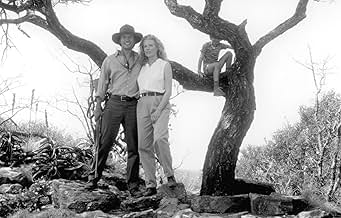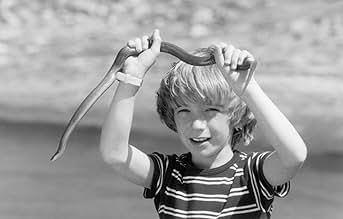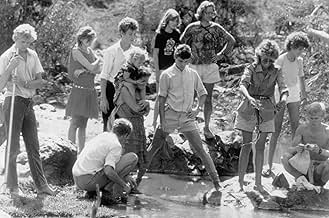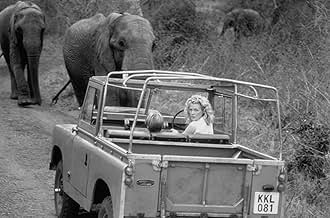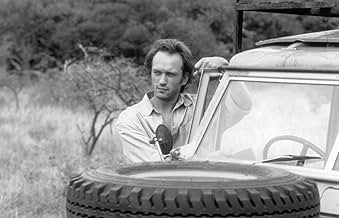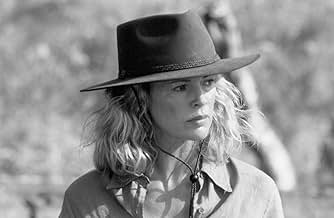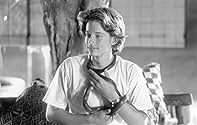NOTE IMDb
5,6/10
5 k
MA NOTE
Une mondaine italienne qui s'ennuie abandonne son style de vie de la jet-set pour les rigueurs et les récompenses de la campagne kenyane dans cette histoire vraie, basée sur les mémoires à s... Tout lireUne mondaine italienne qui s'ennuie abandonne son style de vie de la jet-set pour les rigueurs et les récompenses de la campagne kenyane dans cette histoire vraie, basée sur les mémoires à succès de Kuki Gallmann.Une mondaine italienne qui s'ennuie abandonne son style de vie de la jet-set pour les rigueurs et les récompenses de la campagne kenyane dans cette histoire vraie, basée sur les mémoires à succès de Kuki Gallmann.
- Réalisation
- Scénario
- Casting principal
- Récompenses
- 3 nominations au total
James Ngobese
- Luka
- (as James Ngcobo)
Stephen Jennings
- Vincenzo
- (as Steven Jennings)
Avis à la une
This film was a fluff piece that succeeded better as a showcase for Kim Bassinger and Africa's natural beauty than it did at telling this true story. The first hour of the film was a succession of Kodak moments depicting the romantic splendor of Africa and how idyllic it would be to live there. Although they showed the occasional storm and threatening wild animal, every effort was made to emphasize the positives. They glossed over little things like the oppressive heat (Kenya straddles the equator but no one in the film ever broke a sweat), insects (not a mosquito in sight), and the fact that the rainy season is three months long and it often rains nonstop for weeks. The first hour seemed more like an advertisement by the Kenyan ministry of tourism than a feature film. It wasn't until the second hour that the story really centered on the characters.
Filming Africa is a cinematographer's dream. Unfortunately, Director Hugh Hudson seems to have been so enamored with creating beautiful photography (and it was truly magnificent) that he rushed through the dramatic elements to get to the next helicopter shot of wild animals loping across the plains. Many of the important dramatic scenes were not allowed to fully develop, giving a snippet and then cutting away to a completely unrelated scene. This took much of the impact out of the film. One example is the egg hanging over the bed. A big point was made over the fact that Paolo had put something in the egg. Yet, we never learn what it is. Why tease us with this tidbit if he is not going to follow through?
The film had strong conservationist undertones, but they were tastefully done and not overly preachy. The point was made that poaching to hunt elephants for ivory is illegal and unconscionable, but it was presented in a way that wasn't strident and smug. The scenes of dead elephants made the statement in a poignant way, much better than any dialogue could have.
Kim Basinger was excellent as Kuki. She went with a more natural look which was very flattering. The understated makeup used in the film revealed that even at 47, she is still one of the most beautiful women on the planet. However, after a three-year hiatus since L.A. Confidential, she delivered her second consecutive acting triumph, proving that she is more than just a pretty face. Her acting was far more genuine and mature than any role I had seen her play before. After having read an interview she gave about the film, it is clear that Basinger is a strong conservationist and naturalist and she identified strongly with her role, which imbued her performance with great conviction and believability.
This film was good, but it could have been much better. I rated it a 7/10. The locations and photography were marvelous, but the story's power was frayed by inattention to basic filmmaking tenets. If Hudson had spent more time developing the characters and creating continuity for the story, it would have been an exceptional film.
Filming Africa is a cinematographer's dream. Unfortunately, Director Hugh Hudson seems to have been so enamored with creating beautiful photography (and it was truly magnificent) that he rushed through the dramatic elements to get to the next helicopter shot of wild animals loping across the plains. Many of the important dramatic scenes were not allowed to fully develop, giving a snippet and then cutting away to a completely unrelated scene. This took much of the impact out of the film. One example is the egg hanging over the bed. A big point was made over the fact that Paolo had put something in the egg. Yet, we never learn what it is. Why tease us with this tidbit if he is not going to follow through?
The film had strong conservationist undertones, but they were tastefully done and not overly preachy. The point was made that poaching to hunt elephants for ivory is illegal and unconscionable, but it was presented in a way that wasn't strident and smug. The scenes of dead elephants made the statement in a poignant way, much better than any dialogue could have.
Kim Basinger was excellent as Kuki. She went with a more natural look which was very flattering. The understated makeup used in the film revealed that even at 47, she is still one of the most beautiful women on the planet. However, after a three-year hiatus since L.A. Confidential, she delivered her second consecutive acting triumph, proving that she is more than just a pretty face. Her acting was far more genuine and mature than any role I had seen her play before. After having read an interview she gave about the film, it is clear that Basinger is a strong conservationist and naturalist and she identified strongly with her role, which imbued her performance with great conviction and believability.
This film was good, but it could have been much better. I rated it a 7/10. The locations and photography were marvelous, but the story's power was frayed by inattention to basic filmmaking tenets. If Hudson had spent more time developing the characters and creating continuity for the story, it would have been an exceptional film.
Boy this movie went to video quickly, and now I understand why. It nearly breaks my heart to have to give a thumbs-down to such a huge effort of making a feature film. However, it can't be denied that this movie fell apart from the beginning. I simply did not care about any of the characters and could not connect with them, no matter how I tried. And it's all due to the writing!
It seemed the actors were trying desperately to make up for that lack of continuity and motivation in the script, and so, often their performances seemed contrived, plastic, and/or over-the-top. I think under the guidance of better writing, these actors would shine like we know they can.
What happened to character development and motivation? Perhaps it died in the car crash at the beginning of the film? Was Kuki an American in Italy, or an Italian? Who was the lady that was with Kuki's mother, when they were trying to convince her to come home? Did Kuki and Paolo really love each other or not? Did the people working at Kuki's house become close with her? Kuki seemed oblivious to them. When did Kuki and Ema start speaking the language? It seemed they suddenly just knew it. Why did Ema want to leave to go to school? Kuki was digging a ditch to help out with the water supply, but then we never see any resolution to that situation. What happened??
One of the sweetest moments in the film for me, was when Ema connects with a little African boy, who obviously has a love for snakes too. He shows the boy around his house and introduces them to the snakes he has, and then we never see the boy again (!).
I also would have liked to see what was in the egg that was mentioned repeatedly within the story. Not having the resolution of that aspect (the egg) in particular, left me angry as the credits rolled.
"I Dreamed of Africa" did have interesting scenery and I believe talented cast and crew, but because the script was so bad, everything else really fell apart.
It seemed the actors were trying desperately to make up for that lack of continuity and motivation in the script, and so, often their performances seemed contrived, plastic, and/or over-the-top. I think under the guidance of better writing, these actors would shine like we know they can.
What happened to character development and motivation? Perhaps it died in the car crash at the beginning of the film? Was Kuki an American in Italy, or an Italian? Who was the lady that was with Kuki's mother, when they were trying to convince her to come home? Did Kuki and Paolo really love each other or not? Did the people working at Kuki's house become close with her? Kuki seemed oblivious to them. When did Kuki and Ema start speaking the language? It seemed they suddenly just knew it. Why did Ema want to leave to go to school? Kuki was digging a ditch to help out with the water supply, but then we never see any resolution to that situation. What happened??
One of the sweetest moments in the film for me, was when Ema connects with a little African boy, who obviously has a love for snakes too. He shows the boy around his house and introduces them to the snakes he has, and then we never see the boy again (!).
I also would have liked to see what was in the egg that was mentioned repeatedly within the story. Not having the resolution of that aspect (the egg) in particular, left me angry as the credits rolled.
"I Dreamed of Africa" did have interesting scenery and I believe talented cast and crew, but because the script was so bad, everything else really fell apart.
What's up with all these negative comments? Out of all the comments I read on this site, less than one fifth of them are positive. I may not be old enough to have seen a huge amount of movies, but I must say that as a 16 year old, I truly enjoyed this movie. Of course, certain moments were meaningless, some parts were a tiny weeny bit confusing, but you caught up with the story within the next two seconds. The acting by the whole cast was amazing, the scenery was gorgeous, hehe and so was Vincent Perez! The music was...um...well displaced at certain times, but overall the movie made me cry twice ( well many things make me cry so you might not want to take that into consideration ) the story was quite well constructed, the actors did a great job. (I have an enormous amount of respect for actors as I want to be one someday, so I do not believe that any performance can be bad, some can be improved in certain ways, but nothing is ever awful and only constructive criticism should be given to actors. As I've always been told: If you can't say anything nice, don't say anything at all. A few of the people who commented on the performances should have been taught that.) I have given this movie a 9 out of 10. It may not be one of the best movies ever made, but not one movie has ever been absolutely perfect, and I truly think this one deserves much better reviews that it has gotten, although that is JMHO and everyone has their own, so I'm not dissing anyone's POV. Well that's all of my rambling for today ;)
I Dreamed of Africa is a movie based on a true story about a woman who changes her and her son`s life when she goes to live to a ranch in Kenya with her second husband. Some parts of the movie do not make any sense, or they look incomplete. That is because they show how hard living in Kenya is; but they aren`t an important part of the story. Another bad thing about it is that it`s way to predicable: you know that something will happen to Paolo (Kuki`s husband) since the first time he goes away hunting; and every time Ema (short for Emanuel, her son) grabs a snake you prepare yourself for a funeral. It is a shocking movie and you may go out of the movie theater hating Africa; but it shows some important parts of the living difficulties in places like Kenya. Altogether I think that it was a worthwhile movie, specially for us Kenya lovers, and you can get to know amazing parts of African savannahs.
As someone who loves African scenery and doesn't mind ogling Kim Bassinger, either, I was looking forward to seeing this film. It turned out to be disappointing. The scenery wasn't nearly what I had hoped, certainly no "Out Of Africa," and the story was, in a word: boring.
I never quite understood, or was told, a number of things in here, such as how the leading lady "Kuki Gallman") in this movie and her husband, financially survived. He was out fishing and hunting with his buddies all the time and she was home building some sort of wildlife conversation. One almost got to the point of asking, "What's the point of this story?" outside of being some sort of travelogue. That's the feel I got; an overly-long documentary about living in Kenya. It gets boring quickly.
Given the circumstances and scenery, this movie should have been fascinating, but it tedious. I'm not surprised it flopped at the box office and video stores.
I never quite understood, or was told, a number of things in here, such as how the leading lady "Kuki Gallman") in this movie and her husband, financially survived. He was out fishing and hunting with his buddies all the time and she was home building some sort of wildlife conversation. One almost got to the point of asking, "What's the point of this story?" outside of being some sort of travelogue. That's the feel I got; an overly-long documentary about living in Kenya. It gets boring quickly.
Given the circumstances and scenery, this movie should have been fascinating, but it tedious. I'm not surprised it flopped at the box office and video stores.
Le saviez-vous
- AnecdotesFinal score for a theatrical movie by Composer Maurice Jarre.
- GaffesThere is a visible string suspending the airborne plate that Paolo shoots (in the party scene, just after they arrive in Africa).
- Citations
Kuki Gallmann: We think we control this place, but this place controls us.
- Crédits fousEnd credits runs entirely over aerial shots from African landscapes.
- ConnexionsFeatured in The Rosie O'Donnell Show: Épisode #4.165 (2000)
- Bandes originalesVoi che sapete
From 'Le Nozze di Figaro'
Music by Wolfgang Amadeus Mozart
Libretto by Lorenzo da Ponte
Performed by Brigitte Fassbaender with the Wiener Philharmoniker (as Vienna Philharmonic Orchestra)
Conducted by István Kertész
Courtesy of The Decca Record Company Limited/London
Under license from Universal Music Special Markets
Meilleurs choix
Connectez-vous pour évaluer et suivre la liste de favoris afin de recevoir des recommandations personnalisées
- How long is I Dreamed of Africa?Alimenté par Alexa
Détails
- Date de sortie
- Pays d’origine
- Langue
- Aussi connu sous le nom de
- Pasión por África
- Lieux de tournage
- Sociétés de production
- Voir plus de crédits d'entreprise sur IMDbPro
Box-office
- Budget
- 50 000 000 $US (estimé)
- Montant brut aux États-Unis et au Canada
- 6 651 522 $US
- Week-end de sortie aux États-Unis et au Canada
- 2 411 445 $US
- 7 mai 2000
- Montant brut mondial
- 14 400 327 $US
- Durée1 heure 54 minutes
- Couleur
- Mixage
- Rapport de forme
- 2.39 : 1
Contribuer à cette page
Suggérer une modification ou ajouter du contenu manquant

Lacune principale
By what name was Je rêvais de l'Afrique (2000) officially released in India in English?
Répondre

